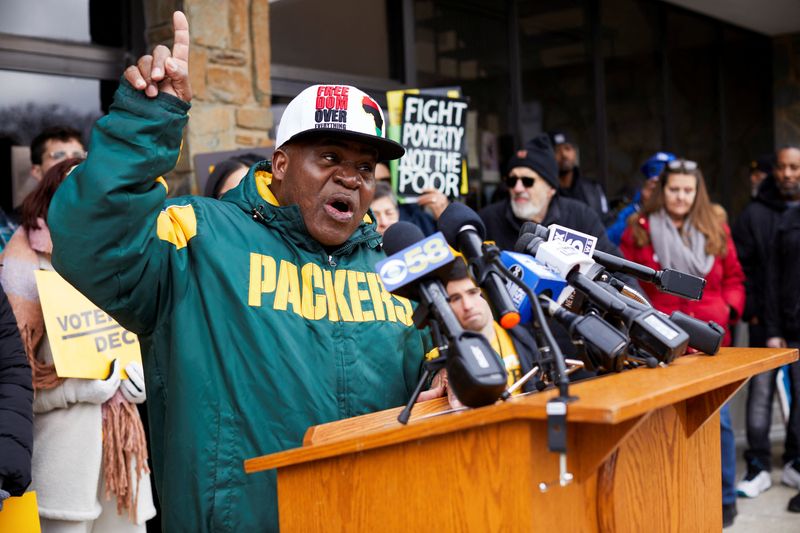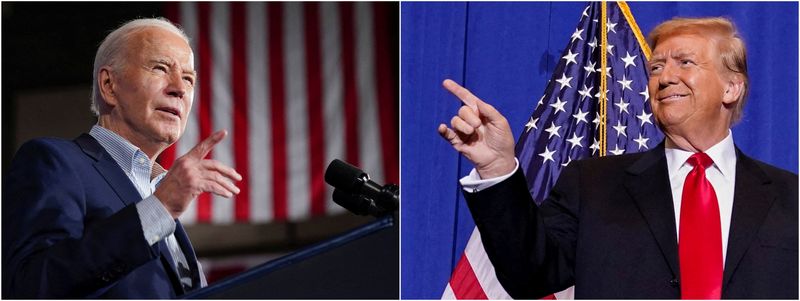By Bianca Flowers
MILWAUKEE, WISCONSIN (Reuters) -Orlando Owens, a rare Republican activist in a majority-Black district of Milwaukee, had hoped this election season would be different.
With national polls showing waning enthusiasm for Democratic President Joe Biden, especially among Black voters who say they are frustrated with his performance on the economy and other issues, state Republican party officials and activists saw an opening.
Wisconsin holds its primary on Tuesday, where voters will weigh in on the presidential race, weeks after Biden and Republican presidential candidate Donald Trump clinched their respective nominations.
Wisconsin Republicans hosted a Black History Month event in February at the party's community engagement center in the historically Black Bronzeville neighborhood. Owens, the Republican party representative for the city's six majority-Black wards, is planning a roundtable of Black business and church leaders this month and a door-knocking campaign aimed at undecided voters.
But the voter engagement drive was thrown into confusion when the Republican National Committee last month announced it was axing plans for 40 community centers aimed at organizing Black, Hispanic and Asian American voters - underlining the challenges the party faces in persuading Milwaukee's Black voters that they are committed to the community, beyond November's elections.
"Our commitment has always been questioned - but regardless of a building, we are going to be here even if we have to work out of satellite offices or garages," Owens said.
The state party said it will keep the Bronzeville community engagement center open.
Reuters spoke to nearly 30 Black voters in majority-Black neighborhoods of Milwaukee, about half of whom said they remained undecided about voting for Biden in November or voting at all. About 10 of the 15 residents who are unhappy with Biden also expressed skepticism about Republicans' long-term commitment to the area and to issues of concern to Black voters.
One-third of those 30 voters, mostly retirees, said they planned to vote Biden in for a second-term.
Strong turnout from Black voters in Wisconsin and a handful of other states helped propel Biden to the White House in 2020 and those same states are also expected to help decide the 2024 elections.
The Democrat won Wisconsin by fewer than 21,000 votes, but carried Milwaukee by roughly 146,000 votes with 53% of those votes cast in majority-Black wards, according to an analysis of election and census data by John Johnson, a public policy research fellow at Marquette Law School Lubar Center.
"It's fair to say that without Milwaukee, Biden would've lost Wisconsin," Johnson said.
A Pew Research Center poll showed Biden's approval rating among non-Hispanic Black adults fell to 48% in January from a peak of 89% in April 2021.
PLANTING A FLAG
The Republican effort to win over Black voters started in 2020 with the opening of the Bronzeville community center. It ramped up in 2022 when the RNC selected Milwaukee to host the party's convention.
Bronzeville is located 1 mile (1.6km) north of the Fiserv (NYSE:FI) Forum where Republicans will convene in July to formally nominate Trump.
In the early 20th century, the neighborhood thrived as a center for entertainment and commerce. But the construction of a freeway through the heart of the neighborhood in the 1960s resulted in the demolition of over 8,000 homes and the displacement of businesses.
"It seems pretty obvious on its face they are trying to go into the most Democratic part of Wisconsin to plant a flag," said Jon Fleischman, a Republican strategist. "I think the party sees Donald Trump's candidacy as an opportunity to create new constituency groups."
The Republican party office, located on Martin Luther King Jr. Drive, is decorated with a distinctive white starburst on a red and blue backdrop of the Juneteenth flag, commemorating the emancipation of the last enslaved people at the end of the civil war.
Inside, a collage features Black Republican congressional members, portraits of civil rights leaders - and an image of Trump, a polarizing figure who has employed racist rhetoric.
The outreach center sat mostly idle during the COVID-19 pandemic.
Brian Schimming, the state party chairman, acknowledged that consistent engagement will be crucial to winning over Black voters.
"What's happened to Republicans in past years is that you spend money where your most loyal voters are - cities and places you don't pay much attention to, you start doing worse," Schimming said. "I'm all about being there and listening to people. If we don't do that, frankly we shouldn't win."
A person familiar with the matter told Reuters that Trump's team, now in control of the RNC, did not like the community centers and believed the money would be better used on hiring people in the community to engage with voters.
Wisconsin Republicans plan to hire neighborhood canvassers this spring to step up its door-to-door campaign efforts, purchase radio ads aimed at Black audiences and eventually staff the office in Bronzeville full-time, Schimming said.
Party officials said their voter outreach efforts will highlight resident concerns including inflation, rise in robberies and carjackings and the Biden administration's handling of migration at the U.S.-Mexico border.
Café owner Shana Gray, who voted for Trump in 2020 and is planning to do so again, said inflation has been hard on local Black-owned businesses. "I used to get like 40 to 50 customers an hour. Now I'm lucky if I get that many a day," she said.
While party leaders have expressed their long-term commitment to the community, some residents remain skeptical about their motives.
When Gloria Harper, a 46-year-old teacher and author, first spotted the signage for the office in 2020 she said she contacted her local city councillor to complain that it was a "bad idea".
"It's strategic for them to put that in the Black community because you want to garner more Black votes - but realistically, 'what have you done for the Black community?' Not much."
COMING UP WITH THE 'TANGIBLES'
A poll conducted by left-leaning political action committee BlackPAC, in partnership with Democratic polling firm, Brilliant Corners, found Black support for Trump among likely voters in seven swing states, including Wisconsin, slipped to 8% in February 2024 from 9% in November last year.
Robert Brox, a small business owner in Milwaukee voted for Biden in 2020 but said he is likely to sit out this election. He said his business has struggled to access government-backed loans through the Small Business Administration.
"It's all about who's coming up with the tangibles for Black and brown businesses. If you're not, you're not getting voted for," he said.
Democratic strategists acknowledge that Biden needs to shore up his support among Black voters if he is going to hold on to Wisconsin in November.
The Milwaukee Election Commission's voting data shows a 19% decline in turnout from majority Black districts in presidential elections since 2012.
The Biden campaign has started airing radio ads in Wisconsin and other battleground states touting a record low in the Black unemployment rate and an increase in Black-owned small businesses.
"He's not going to lose the African-American vote in Wisconsin but losing even a few votes can make a difference between winning and losing a state, and potentially losing the White House," said Mark Mellman, a Democratic strategist.
Democrats are confident that updated legislative maps will blunt the impact of Republican courtship of Black voters. The maps were signed into law in February after the Wisconsin Supreme Court overturned Republican-drawn maps designed to limit representation from Democratic areas.
Ben Wikler, chairman of the Democratic Party of Wisconsin, said that fair districting could boost voter turnout.
"Republicans have had a hammerlock on the state's legislature so we haven't been able to pass laws. There's an understandable cynicism of voting and voting, and not seeing change." he said.

Meanwhile, Biden retains support among some Black voters, such as 70 year-old retiree Michael Shands who believes that job growth for Black Americans has flourished during his time in office.
"He's done more than any other president. I need him to be here four more years so he can finish the job."
